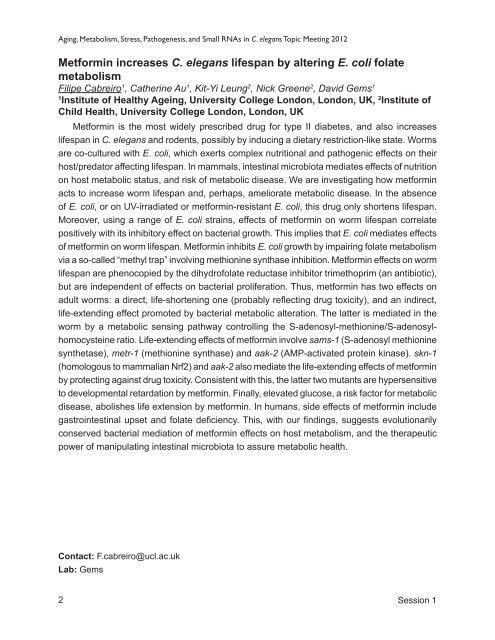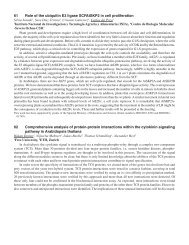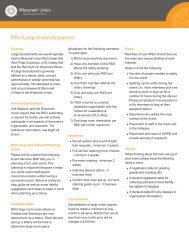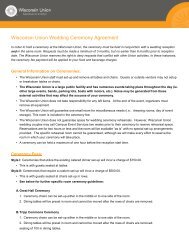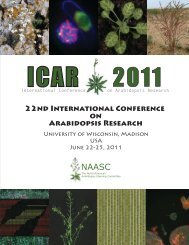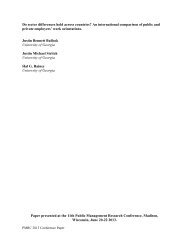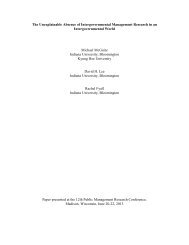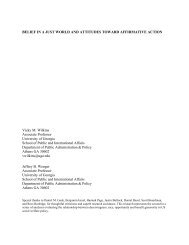PROGRAM & ABSTRACTS - Wisconsin Union - University of ...
PROGRAM & ABSTRACTS - Wisconsin Union - University of ...
PROGRAM & ABSTRACTS - Wisconsin Union - University of ...
Create successful ePaper yourself
Turn your PDF publications into a flip-book with our unique Google optimized e-Paper software.
Aging, Metabolism, Stress, Pathogenesis, and Small RNAs in C. elegans Topic Meeting 2012<br />
Metformin increases C. elegans lifespan by altering E. coli folate<br />
metabolism<br />
Filipe Cabreiro 1 , Catherine Au 1 , Kit-Yi Leung 2 , Nick Greene 2 , David Gems 1<br />
1 Institute <strong>of</strong> Healthy Ageing, <strong>University</strong> College London, London, UK, 2 Institute <strong>of</strong><br />
Child Health, <strong>University</strong> College London, London, UK<br />
Metformin is the most widely prescribed drug for type II diabetes, and also increases<br />
lifespan in C. elegans and rodents, possibly by inducing a dietary restriction-like state. Worms<br />
are co-cultured with E. coli, which exerts complex nutritional and pathogenic effects on their<br />
host/predator affecting lifespan. In mammals, intestinal microbiota mediates effects <strong>of</strong> nutrition<br />
on host metabolic status, and risk <strong>of</strong> metabolic disease. We are investigating how metformin<br />
acts to increase worm lifespan and, perhaps, ameliorate metabolic disease. In the absence<br />
<strong>of</strong> E. coli, or on UV-irradiated or metformin-resistant E. coli, this drug only shortens lifespan.<br />
Moreover, using a range <strong>of</strong> E. coli strains, effects <strong>of</strong> metformin on worm lifespan correlate<br />
positively with its inhibitory effect on bacterial growth. This implies that E. coli mediates effects<br />
<strong>of</strong> metformin on worm lifespan. Metformin inhibits E. coli growth by impairing folate metabolism<br />
via a so-called “methyl trap” involving methionine synthase inhibition. Metformin effects on worm<br />
lifespan are phenocopied by the dihydr<strong>of</strong>olate reductase inhibitor trimethoprim (an antibiotic),<br />
but are independent <strong>of</strong> effects on bacterial proliferation. Thus, metformin has two effects on<br />
adult worms: a direct, life-shortening one (probably reflecting drug toxicity), and an indirect,<br />
life-extending effect promoted by bacterial metabolic alteration. The latter is mediated in the<br />
worm by a metabolic sensing pathway controlling the S-adenosyl-methionine/S-adenosylhomocysteine<br />
ratio. Life-extending effects <strong>of</strong> metformin involve sams-1 (S-adenosyl methionine<br />
synthetase), metr-1 (methionine synthase) and aak-2 (AMP-activated protein kinase). skn-1<br />
(homologous to mammalian Nrf2) and aak-2 also mediate the life-extending effects <strong>of</strong> metformin<br />
by protecting against drug toxicity. Consistent with this, the latter two mutants are hypersensitive<br />
to developmental retardation by metformin. Finally, elevated glucose, a risk factor for metabolic<br />
disease, abolishes life extension by metformin. In humans, side effects <strong>of</strong> metformin include<br />
gastrointestinal upset and folate deficiency. This, with our findings, suggests evolutionarily<br />
conserved bacterial mediation <strong>of</strong> metformin effects on host metabolism, and the therapeutic<br />
power <strong>of</strong> manipulating intestinal microbiota to assure metabolic health.<br />
Contact: F.cabreiro@ucl.ac.uk<br />
Lab: Gems<br />
2<br />
Session 1


